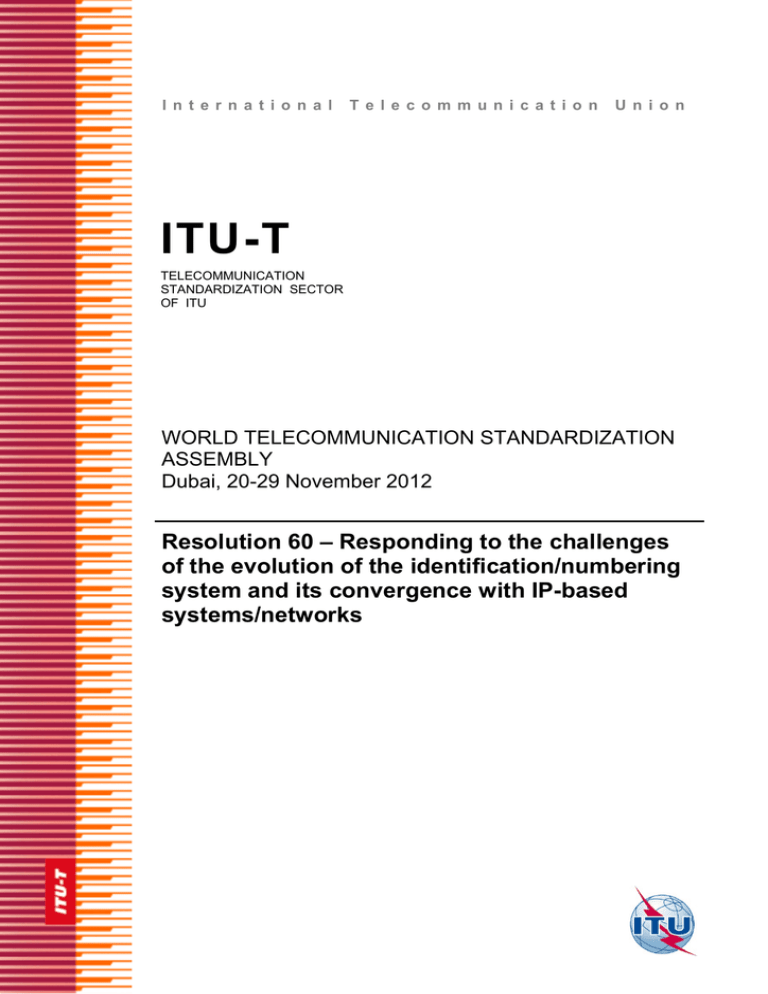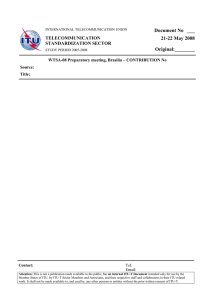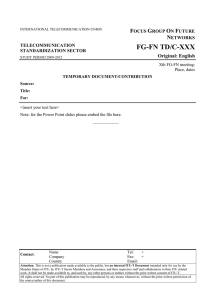
I n t e r n a t i o n a l
T e l e c o m m u n i c a t i o n
U n i o n
ITU-T
TELECOMMUNICATION
STANDARDIZATION SECTOR
OF ITU
WORLD TELECOMMUNICATION STANDARDIZATION
ASSEMBLY
Dubai, 20-29 November 2012
Resolution 60 – Responding to the challenges
of the evolution of the identification/numbering
system and its convergence with IP-based
systems/networks
FOREWORD
The International Telecommunication Union (ITU) is the United Nations specialized agency in the field of telecommunications. The ITU Telecommunication Standardization Sector (ITU-T) is a permanent organ of ITU. ITU-T is
responsible for studying technical, operating and tariff questions and issuing Recommendations on them with a view to
standardizing telecommunications on a worldwide basis.
The World Telecommunication Standardization Assembly (WTSA), which meets every four years, establishes the
topics for study by the ITU-T study groups which, in turn, produce Recommendations on these topics.
The approval of ITU-T Recommendations is covered by the procedure laid down in WTSA Resolution 1.
In some areas of information technology which fall within ITU-T's purview, the necessary standards are prepared on a
collaborative basis with ISO and IEC.
ITU 2013
All rights reserved. No part of this publication may be reproduced, by any means whatsoever, without the prior written
permission of ITU.
RESOLUTION 60 (Rev. Dubai, 2012)
Responding to the challenges of the evolution of the identification/numbering
system and its convergence with IP-based systems/networks
(Johannesburg, 2008; Dubai, 2012)
The World Telecommunication Standardization Assembly (Dubai, 2012),
recognizing
a)
Resolution 133 (Rev. Guadalajara, 2010) of the Plenipotentiary Conference, with regard to the
continuing progress towards integration of telecommunications and the Internet;
b)
Resolutions 101 and 102 (Rev. Guadalajara, 2010) of the Plenipotentiary Conference;
c)
the evolving role of the World Telecommunication Standardization Assembly, as reflected in
Resolution 122 (Rev. Guadalajara, 2010) of the Plenipotentiary Conference,
noting
a)
the work in Study Group 2 of the ITU Telecommunication Standardization Sector (ITU-T),
on investigating the evolutionary aspect of the numbering system, including the "future of numbering",
considering next-generation networks (NGN) and future networks (FN) as the working environment of the
numbering system in the future;
b)
that the transition from traditional networks to IP-based networks is taking place at a fast pace,
whilst there is a transition to NGN and FN;
c)
the emerging issues concerning administrative control for international telecommunication servicebased numbers;
d)
the forthcoming issues concerning the convergence of numbering, naming, addressing and
identification systems along with the development of NGN and FNs, and associated issues concerning
security, signalling, portability and migration;
e)
the growing demand for numbering/identification resources for communications referred to as
machine-to-machine (M2M);
f)
the need for principles and a roadmap for the evolution of international telecommunication
resources, which would be expected to help the timely, predictable deployment of advanced identification
technologies,
resolves to instruct ITU-T Study Group 2, within the mandate of ITU-T
1
to continue studying, in liaison with the other relevant study groups, the necessary requirements for
the structure and maintenance of telecommunication identification/numbering resources in relation to the
deployment of IP-based networks and the transition to NGN and FN;
2
to ensure the development of the administrative requirements for identification/numbering resource
management systems in NGN and FN;
WTSA-12 – Resolution 60
1
3
to continue developing guidelines, as well as a framework, for the evolution of the international
telecommunication numbering system and its convergence with IP-based systems, in coordination with
related study groups and associated regional groups, so that a basis for any new application can be provided,
instructs relevant study groups, and in particular ITU-T Study Group 13
to support the work of Study Group 2, to ensure that such applications are based on appropriate guidelines,
as well as a framework, for the evolution of the international telecommunication numbering/identification
system, and to help investigate their impact on the numbering/identification system,
instructs the Director of the Telecommunication Standardization Bureau
to take appropriate action to facilitate the foregoing work regarding the evolution of the
numbering/identification system or its converged applications,
invites Member States and Sector Members
1
to contribute to these activities, taking into consideration their national concerns and experiences;
2
to participate in and to contribute to regional groups discussing the issue and to promote the
participation of developing countries in those discussions.
2
WTSA-12 – Resolution 60



